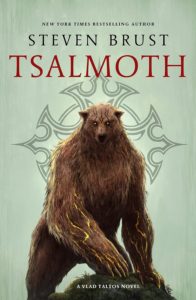 As you certainly know if you know what book I’m reviewing based on the title alone, the Vlad Taltos books bounce around in chronology, with gleeful abandon. Whether this is part of some grand design on the part of the author, or whether he just writes a new story whenever he thinks of one, and drops it in wherever it happens to fit? Not only do I have no idea, I’m not sure it’s possible to know the answer. (Probably Brust knows, but given his utility at writing a character like Vlad, could you ever fully trust his response?)
As you certainly know if you know what book I’m reviewing based on the title alone, the Vlad Taltos books bounce around in chronology, with gleeful abandon. Whether this is part of some grand design on the part of the author, or whether he just writes a new story whenever he thinks of one, and drops it in wherever it happens to fit? Not only do I have no idea, I’m not sure it’s possible to know the answer. (Probably Brust knows, but given his utility at writing a character like Vlad, could you ever fully trust his response?)
Tsalmoth goes back nearly to the beginning, interleaving wedding planning with… well, if you don’t know Vlad, and this is for some reason your first exposure, he is a talented assassin who has leveraged that skill (and the money it brings) into a low level boss position in a criminal enterprise[1]. So when I say his concern is with a simple collections job, you understand the kind of collections I’m talking about. Anyway: the book interleaves planning for Vlad’s wedding to Cawti (also a talented assassin, among other things) with his concern about a simple collections job with a twist: the person who owes him money is recently dead.
That’s the superficial plot summary, but what I’m interested in from the 16th book in a (I’m estimating here) 19 book series (not counting an extensive spinoff selection) is the stuff beneath the surface, which of course means spoilers not only for this book but for a lot of other incidental books. Hence, a cut.
[1] Boy is there ever a lot more to it than that, but I’m doing a baseline introduction here.
So, were there tons of easter eggs and things? Yes, of course. The closer he gets to the end, the more I want to reread the whole series in a row, and figure out what else I should know and have missed, and not to mention if there are perhaps reverse easter eggs about things he’s known all along and only got around to writing down much later.
But what I found interesting is how open and happy this Vlad is. I don’t mean first bloom of love Vlad, before the problems, although I don’t not mean that. I mean that maybe Sethra took something from him when she erased his memory of those events. Inadvertently took away the foundational feelings Vlad had for his fiancée, enabling the subsequent outcomes during Teckla, a book that was so hard to read that every time I think about going back and reading the series again, it is singlehandedly why I don’t.
What I really wonder is, is this Brust trying to between the lines rehabilitate Vlad? Like, because while the choice he made here was his responsibility, the outcomes were not entirely his fault? (They were nobody’s fault, to listen to a Jimmy Buffet song in reverse.) I guess what I’m really trying to say is, it is hard to reconcile the Vlad who will throw away his 800 because it would mean he’s just somebody’s tool with the Vlad who doesn’t really care about the plight of the Teckla at all just a few years later. And then here comes Brust to give us a magical explanation, and so… yeah. This definitely feels like a rehabilitative retcon. (Not that Vlad cared about the Teckla in this book, because he didn’t. But he lost the insight that would have allowed him to understand Cawti’s perspective down the road.)
To be clear, I’m not sure if I disapprove. But I’m not sure I approve either. (And this is far from the first retcon in the book! Like, Morrolan’s window only working for demons? Did we already know that and this explains the discrepancy, or was it mentioned here and then never mentioned “again”?)
Anyway: man I love these books.